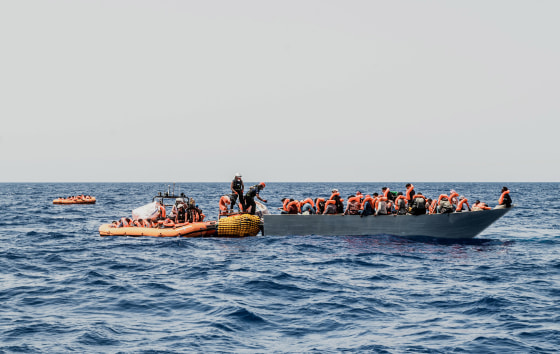LONDON — The number of migrants, asylum seekers and refugees who have died while attempting to reach Europe by sea has more than doubled so far this year, according to a new report from the United Nations’ migration agency.
In the first six months of 2021, at least 1,146 people lost their lives while risking the journey to European shores, according to the International Organization for Migration’s report.
The death toll represents a rise of 123 percent compared with the same period last year, when the IOM recorded 513 deaths. Coronavirus restrictions enforced in early 2020 could explain some of the rise.
But the number of people who died while attempting to cross the Mediterranean so far this year — 896 — has already surged past the 615 who died in the same time frame in 2019, and the 389 who died in 2020.
The IOM has warned that the death toll for all three years is likely much higher, with many shipwrecks going unreported or proving difficult to verify.
“We believe that the number of deaths is much higher than officially reported,” IOM spokesperson Safa Msehli told NBC News. “There are so many reports of invisible shipwrecks — when a boat goes missing with no news.”
“Just a few weeks ago, we recorded at least 14 bodies washing ashore in Libya without knowing exactly what tragedy had occurred and where. So that’s the most alarming part.”
According to IOM, the central Mediterranean route between Libya and Italy proved to be the deadliest this year, with 741 people perishing at sea.
At least 250 people died while traveling across the Atlantic Ocean between West Africa and Spain’s Canary Islands and at least 249 lost their lives on the Western Mediterranean route to Spain.
Meanwhile, at least six people died on the Eastern Mediterranean route to Greece, the IOM said.
Many of those deaths, Msehli said, could have been avoided with stronger action from European nations.
In particular, Msehli said there needs to be an European Union-led “search and rescue” effort, as well as greater support for rescue operations run by non-governmental organizations (NGOs).
She further said that creating “safe and legal pathways” to Europe and cracking down on human trafficking and smuggling groups would also be critical to preventing deaths at sea.
Download the NBC News app for breaking news and politics
Duccio Staderini, head of search and rescue operations for Médecins Sans Frontières, said rescue ships run by NGOs are being targeted more by authorities in southern Europe than before.
Speaking from on-board the Geo Barents — a Médecins Sans Frontières-run search and rescue vessel that was recently seized by Italian authorities following an inspection — Staderini said Italy, in particular, has seen the number of rescue ships detained over recent years had increased, bringing life-saving operations to a halt at times for months, if not longer.
“There is a very strong criminalization of search and rescue activities in southern Europe nowadays. After working in this sector close to 25 years, I was not expecting to be in the situation of being criminalized in Europe and this is very shocking,” he said.
In a statement shared with Italian broadcaster Sky TG24 shortly after the Geo Barents was detained, the Italian Coast Guard said the ship was held after an inspection revealed "several irregularities," including not having enough life-saving equipment on board to accommodate the potential hundreds who could be brought aboard the ship.
Staderini said that MSF is working to address the issues raised by the Coast Guard, but warned that the delay could come at the cost of lives at sea.
He further said that he fears that Italy may be hoping to deter migrants, asylum seekers and refugees from attempting the journey to the country’s shores by blocking rescue ships from operating at sea.
“There is this idea that if there is no search and rescue, people will stop coming, but as we have observed, even today people are probably attempting to cross, even if there is no search and rescue capacity and we know from observing in the last months and years, this doesn’t impact the influx,” he said.
In a meeting in May, both Italian Interior Minister Luciana Lamorgese and Libyan Interior Minister Khaled Tijani Mazen expressed their commitment to ensuring “full respect for the human rights of migrants and in particular people in need of international protection”.
They also stressed the need for “more effective management” of migration, however, with emphasis placed on the EU’s role in helping manage migration flows.

